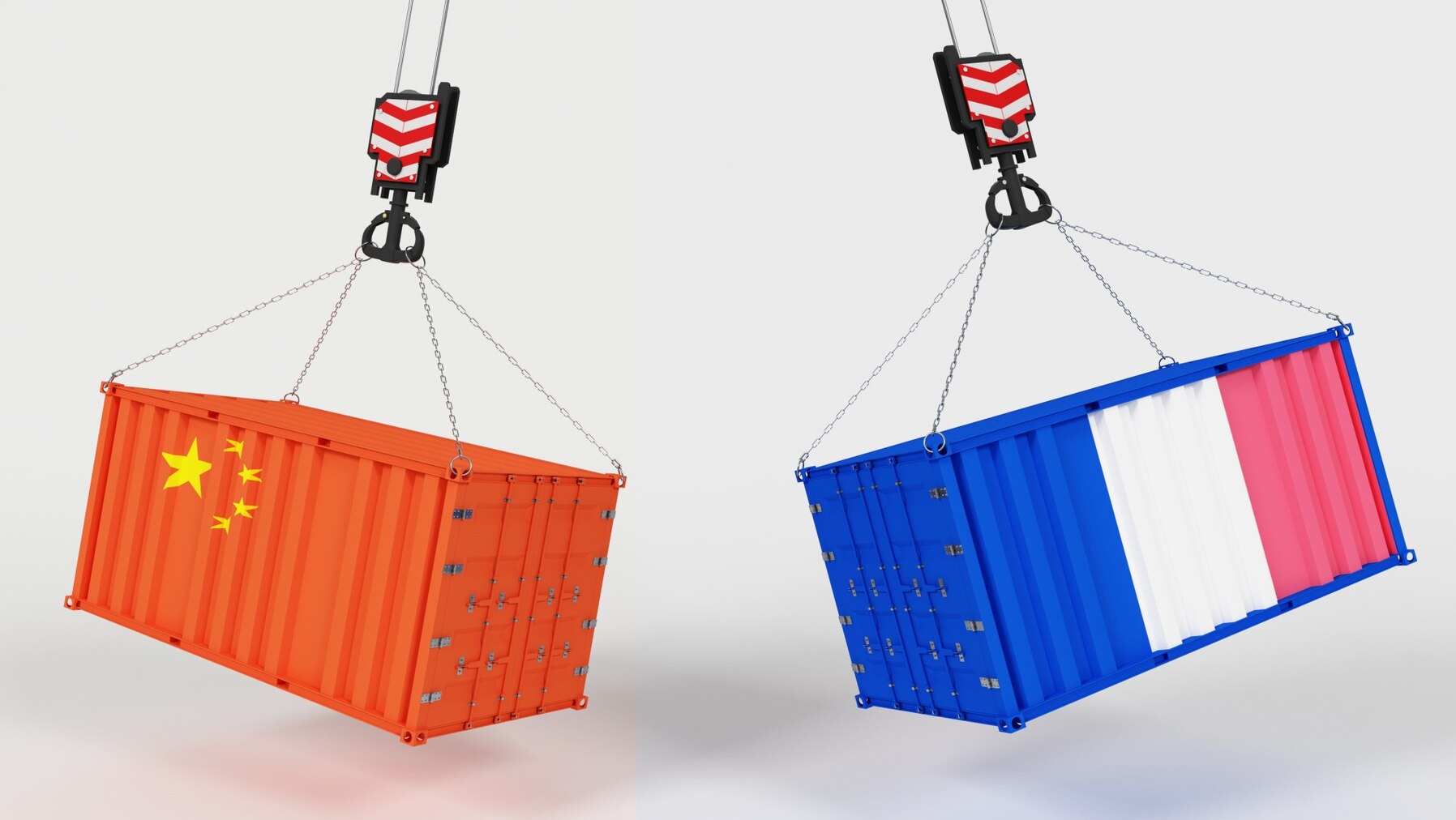China-France economic and trade relations remain resilient despite setbacks

By Liu Gongrun and Chen Xi
French President Emmanuel Macron’s recent visit to China marked the third trip to the country since taking office in 2017, and his first since the end of China’s zero-COVID policy last year. The French delegation accompanying President Macron consisted of nearly 100 people, including former French Prime Minister and CEIBS Distinguished Professor Jean-Pierre Raffarin and President of the Constitutional Council Laurent Fabius, as well as several ministers, parliamentarians, business leaders, and representatives from companies such as Airbus, EDF, Alstom, L’ORÉAL Paris, Veolia, and BNP Paribas. Their presence highlights France’s emphasis on restarting economic and trade cooperation between the two countries.
Bilateral trade can serve as a cornerstone for China-France relations
France has long been one of China’s most important economic and trade partners. In the past few years, despite a number of relationship setbacks – such as COVID-19 and the Russia-Ukraine conflict – economic exchange between the countries has continued to grow. According to data from the French National Institute of Statistics, in 2022, China-France trade in goods exceeded the 100 billion euro mark for the first time, increasing from 88.8 billion euros in 2021 to 101.9 billion euros in 2022, a growth rate of 14.7%.
Among the 27 EU member countries, France is China’s second-largest import partner and fourth-largest export partner, accounting for 12.5% and 8.1% of China’s total imports and exports to the EU in 2022, respectively. However, since the outbreak of the COVID-19 pandemic in 2020, the imbalance in trade between China and France has widened. According to the statistics of the General Administration of Customs of China, France’s trade deficit with China increased from $7.2 billion (USD) in 2020 to $10.1 billion in 2022, an increase of 1.39 times.
At the same time, due to soaring energy prices, the depreciation of the euro against the US dollar, and the weakness of French manufacturing, France’s overall trade deficit reached a historic high in 2022, expanding to 164 billion euros, nearly double the 85 billion euros in 2021 (according to French customs statistics).
The prospects for China-France bilateral investment remain promising
As of the end of 2021, China’s direct investment in France amounted to nearly $4.9 billion, accounting for almost 5.1% of China’s direct investment in the EU, and making it the fifth largest investment destination for Chinese companies in the region. According to the 2021 Report on International Investment in France released by Business France, China is the largest Asian country investing in and creating jobs in France. In 2021, Chinese companies made 53 investments in France, creating and preserving 2,169 jobs, an increase of 28% over the previous year, mainly in production and operational activities in the transportation, electrical equipment, and automotive manufacturing sectors.
France is also the third largest source of investment for China in the EU. According to Chinese statistics, as of the end of 2021, more than 6,000 French companies have invested in China, with a total investment stock of $18 billion, mainly concentrated in the fields of aviation, automobiles, energy, and chemicals.
Notably, on the second day of Macron’s visit to China, Airbus CEO Guillaume Faury signed an agreement with the Tianjin Free Trade Zone Investment Company and the Aviation Industry Corporation of China to build a second production line at Airbus Tianjin, doubling the output of A320 series aircraft produced in China.
Energy transformation and green development present new growth opportunities
COVID-19, the energy crisis and high inflation caused by the Russia-Ukraine conflict have continued to hamper the pace of economic recovery in Europe. Nevertheless, the French business delegation’s visit to China highlights hope that France and China can continue to maintain stable and mutually beneficial bilateral relations in the future and seek new breakthroughs in cooperation.
Considering the economic complementarity between China and France and the urgent need for energy transition in Europe due to the energy crisis caused by the Russia-Ukraine conflict and high inflation, the two countries can continue to deepen their economic and trade cooperation in traditional areas such as aviation, nuclear power, agricultural products, and wines in the future. At the same time, they can explore the cooperation in newer areas such as renewable energy and electric vehicles. This can also help boost cooperation between China and France on major global issues such as carbon emissions, biodiversity protection, and ecological transformation.
The cooperation between China and France in the field of energy transition has already yielded initial results. For example, in 2019, China Energy Group and Electricite de France (EDF) signed the first cross-border joint venture offshore wind power project cooperation agreement in China. The project is an important step in EDF’s CAP 2030 strategic plan, which has the goal of doubling the company’s net renewable energy installed capacity globally to 60 million kilowatts by 2030. In 2021, Envision AESC (a subsidiary of China Envision Group) reached a strategic cooperation agreement with French electric vehicle manufacturer Renault Group. Under the agreement, Renault will provide Envision AESC with a five-year order for 40-120 kilowatt-hour power batteries and Envision AESC will support Renault’s comprehensive electrification strategy. In March of this year, China National Offshore Oil Corporation (CNOOC) and French multinational TotalEnergies completed the first liquefied natural gas (LNG) purchase transaction settled in Chinese yuan, with a transaction volume of 65,000 tonnes.
In 2024, China and France will mark the 60th anniversary of the establishment of diplomatic relations between the two countries. At a time when the world is undergoing profound historical changes, as two major countries with global influence, China and France should take this as an opportunity to reboot bilateral economic exchange and trade, stabilize China-France and China-Europe relations and bring more confidence to global prosperity.
Liu Gongrun is the Deputy Director of CEIBS Lujiazui International Institute of Finance (CLIIF). Chen Xi is a research fellow at CLIIF.













